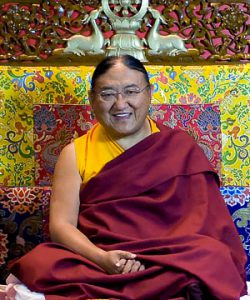
Part II of transcript of a talk given by HH Sakya Trizin in 1988 at E-Vam Institute
Next we need to contemplate impermanence. Although we have gained this precious human birth at the moment, it is not going to last forever. Everything that is created by causes and conditions is impermanent. As it is said in the sutras, the three worlds are like autumn flowers. In autumn time, the flowers bloom and disappear in almost no time. A person’s birth and death are like a dancer’s movements — every moment it changes. A person’s life is like lightning in the sky or a steep waterfall. It does not remain for a single moment. Therefore, we must meditate on this fact that everything is impermanent.
We do not have a definite lifespan. Although today we have got this very precious human birth, we may lose it at any moment. Many people have died even before they were born; others have died right after their birth and others when they were children or teenagers, and so forth. Meditating on impermanence and death helps to speed up our practice. We may think that we can engage in spiritual practice when we are older and get on with other activities while we are young, but one never knows whether one will live until such a time. Everything is impermanent; our life is marked by the uncertainty of our death.
At the time of your death, nothing and nobody can help you. You may be the most intelligent man, you may be the richest man, the most powerful man, the bravest man; whatever you may be, you can do nothing. Even your own body has to be left behind. This body that is so precious, which we care so much about, which has been with us ever since we were conceived, which we worry so much about even with the tiniest of injuries. At the time of death, we have to leave everything behind — our belongings, our friends, our precious bodies, our consciousness, the continuity of our mind — all has to go. At that time, nobody can help us. Who can help you? Only the teachings, the Dharma practice that you do, the practice that you do while you are healthy. At the time of death, this is our only friend, our only saviour. The only thing that is going to help you is the Dharma practice that you have done while you are alive.
There are many great benefits to meditating on impermanence. In the beginning, it will help us to start on our spiritual path; in the middle, it speeds up our spiritual practice and eventually, it also helps us to realise the ultimate truth. Everything is impermanent, everything depends on causes and conditions, and everything depends on everything else. There is no thing that exists independently. No thing actually exists without relying on causes and conditions. We should realise that things are not naturally existing; things are not truly existing, things are not really existing. It is all only illusion. Therefore, meditating on impermanence also helps us to realise the ultimate truth.
If we meditate on these things — impermanence and death, and that only the Dharma practice that you do will help you at the time of death — it will help us to speed up our practice instead of just wasting our time. We must not waste our time when we have such a great opportunity to practise Dharma; we must speed up. Meditating on the precious human birth will arouse the need to practise Dharma. That is the right way to approach our life, the right way of seeing reality. Meditating on impermanence and death is the best way of making offerings to the Buddha, as it is said in the sutras. Meditating on impermanence is the best way of following the Buddha’s teaching.
